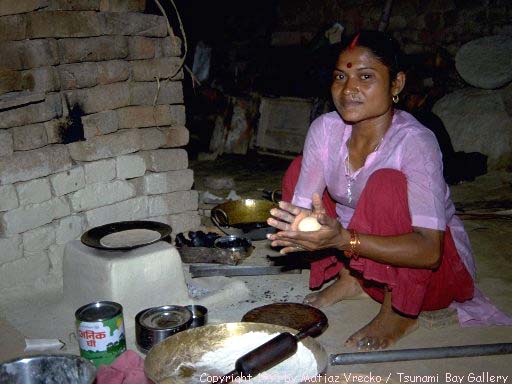
Churning buttermilk..
Durgatai Paranjape, Punes leading Ayurvedic teacher and practising vaidya , is today in her middle seventies. Her father was extremely active well into his nineties, lived with her and her sister, Dr Sindhutai Paranjape, who herself is 77, a practising gynaecologist, obstretician and surgeon (allopathic).
Vd Durgatai, has some very pertinent observations as she sees the old order give way, sometimes tumultously, to the new.
 Churning buttermilk.. |
"Lifestyle , say about 40-50 years ago, consisted of a lot of daily activities, designed automatically, to give that little required exercise or therapy, to your body, and sometimes, even mind, " she observes. "Before the western model of comfort, so to speak, caught on, there was a lot of bending, stretching, twisting of shoulders, using of wrists, etc in your daily work. The cooking platforms were fairly low, so you often sat cross-legged. Bending over the stoves, involved stretching at the waist, hands outstretched. Churning of buttermilk was a wonderful twisting exercise for your waist, arms, actually your whole body, as you drew alternately left and right, on a rope, which was attached across a huge churning rod. That the buttermilk tasted wonderful because of the slow churning was a different thing ! |
 | Floors aften needed to be smeared and coated with cow dung and this work was perfect to keep you supple below the waist. This business of getting prepacked veggies from stores just did not exist. One grew a little bit of stuff, and gardening and maintainance of fruit trees, involved, giving the eyes, some great exercise, looking far and near, not to speak of the neck getting great stretching exercise. Festivals consisted of, among other rituals, the appropriate use of seasonal produce cooked in innovative ways, with natural spices, that added taste cum medicinal value for the season." |